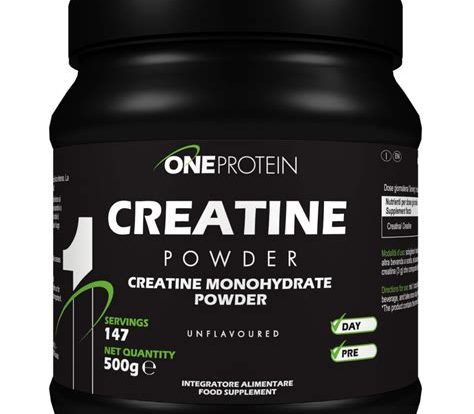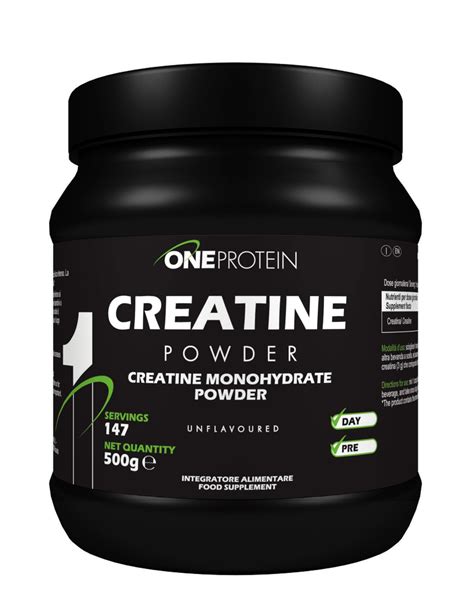

Boost your workout with creatine! This supplement can improve muscle strength, endurance and recovery time. Get ready to see results.
As athletes and fitness enthusiasts are always looking for ways to enhance their performance, creatine has become an increasingly popular supplement. But what exactly is creatine and how can it benefit your workout routine? Firstly, creatine is a natural compound that is found in our bodies and plays a crucial role in energy production. However, by supplementing with creatine, athletes are able to increase the amount of creatine stored in their muscles, leading to improved strength and power output during exercise. In this article, we will delve deeper into the world of creatine and explore its potential benefits and drawbacks.
Daftar Isi
The Basics of Creatine
Creatine is a naturally occurring amino acid found in the body that is responsible for providing energy to the muscles. It is also available as a supplement in the form of creatine monohydrate, which is popular among athletes and bodybuilders. The main purpose of taking creatine supplements is to increase muscle mass and improve athletic performance.
How Creatine Works
Creatine works by increasing the production of ATP (adenosine triphosphate), which is the primary source of energy for the muscles. When you take a creatine supplement, it helps your body produce more ATP, which in turn improves your performance during high-intensity exercises. Creatine also helps to reduce fatigue by buffering lactic acid build-up in the muscles.
The Benefits of Creatine
Creatine supplements have been shown to provide several benefits for athletes and bodybuilders. These include increased muscle mass, improved strength and endurance, faster recovery after exercise, and reduced muscle damage. Creatine has also been linked to improvements in cognitive function, such as memory and attention span.
The Risks of Creatine
While creatine supplements are generally safe for most people, there are some potential risks to be aware of. These include dehydration, muscle cramps, gastrointestinal problems, and kidney damage in rare cases. It is important to stay hydrated when taking creatine, and to avoid taking more than the recommended dosage.
How to Take Creatine
Creatine Loading Phase
When starting a creatine supplement, it is common to go through a loading phase in which you take a higher dosage for the first week or so. This is done to help saturate your muscles with creatine quickly, which can lead to faster results. The recommended loading phase is typically 20 grams per day, split into four equal doses.
Creatine Maintenance Phase
After the loading phase, it is recommended to take a lower dosage of creatine to maintain your muscle saturation levels. The maintenance phase typically involves taking 3-5 grams of creatine per day, preferably after a workout when your muscles are most receptive to absorbing nutrients.
Types of Creatine Supplements
Creatine Monohydrate
Creatine monohydrate is the most popular and well-researched form of creatine supplement. It is affordable, effective, and easy to find in most supplement stores. Creatine monohydrate is also safe for most people to take, and has been shown to provide significant improvements in muscle mass and strength.
Creatine Ethyl Ester
Creatine ethyl ester is a newer form of creatine supplement that is claimed to be more easily absorbed by the body. However, research on its effectiveness is limited, and it is more expensive than creatine monohydrate. Some users have reported digestive issues with this form of creatine.
Other Forms of Creatine
There are several other forms of creatine supplements available, including creatine hydrochloride, buffered creatine, and micronized creatine. These forms have varying degrees of effectiveness and absorption rates, but are generally more expensive than creatine monohydrate.
Conclusion
Creatine supplements can be a useful tool for athletes and bodybuilders looking to improve their muscle mass and athletic performance. However, it is important to understand the potential risks and benefits of creatine, and to follow the recommended dosages and guidelines for use. As with any supplement, it is always a good idea to consult with a healthcare professional before starting to take creatine.
Creatine is a naturally occurring substance found in our bodies, particularly in our muscles. It is also widely used as a sports supplement among athletes and bodybuilders. But what is Creatine exactly? In simple terms, Creatine helps to provide energy to your muscles during high-intensity workouts. The supplement does this by increasing the availability of Adenosine Triphosphate (ATP), the body’s main energy source. By doing so, it helps to delay fatigue and improve exercise performance. Taking Creatine has many potential benefits, including increased strength, power, and muscle mass. It may also help to improve exercise performance and recovery. However, it is important to take Creatine responsibly and follow the recommended dosages. There are several ways to take Creatine, including in powder, pill, or liquid form. It is important to consult with a healthcare professional before starting to use Creatine to ensure it is safe for you. While Creatine is generally considered safe, some users may experience side effects such as stomach discomfort, diarrhea, or dehydration. To avoid these side effects, it is important to stay properly hydrated when taking Creatine. The use of Creatine has been controversial in certain sports, particularly in relation to its safety and legality. However, many sports organizations have deemed it safe and legal for use. Some athletes have been known to abuse Creatine as a performance enhancing drug, taking massive amounts of it for extended periods of time. This can be dangerous and is not recommended. There is limited research on the effects of Creatine on women, but some studies have shown that it may be equally effective for both genders. However, pregnant or breastfeeding women should avoid taking Creatine. Similarly, it is generally not recommended for teenagers under the age of 18 to take Creatine supplements, as their bodies are still developing and the long-term effects are not fully understood. In conclusion, Creatine can be a useful sports supplement for athletes and bodybuilders. However, it is important to use it responsibly and consult with a healthcare professional before starting to use it. With proper usage and hydration, Creatine can help to improve exercise performance and recovery. As with any supplement, it is important to weigh the potential benefits against the risks and make an informed decision.
As a journalist, it is important to provide unbiased information about popular supplements such as creatine. Creatine is a naturally occurring substance found in meat and fish, but is also available as a supplement. Here are some pros and cons to consider before deciding whether or not to use creatine:
Pros:
- Creatine can increase muscle strength and size, making it a popular supplement among athletes and bodybuilders.
- Creatine may improve high-intensity exercise performance, allowing users to train harder and longer.
- Creatine has been shown to have neuroprotective properties, potentially reducing the risk of neurological diseases such as Parkinson’s and Alzheimer’s.
- Creatine is relatively safe for most people when taken in recommended doses.
Cons:
- Creatine can cause gastrointestinal discomfort, including bloating, diarrhea, and gas.
- Creatine may be harmful to people with pre-existing kidney issues, as it can increase the risk of kidney damage or failure.
- Creatine may cause dehydration, as it draws water into the muscles and away from other parts of the body.
- Creatine may not be effective for everyone, and some people may not see any noticeable improvements in strength or performance.
It is important to consult with a healthcare professional before starting any new supplement regimen, including creatine. While creatine may offer some benefits for certain individuals, it is not a magic solution for increased muscle mass or athletic performance. Ultimately, the decision to use creatine should be based on individual goals, health status, and medical history.
As a journalist, it is my duty to provide accurate and unbiased information to my readers. In the world of fitness and bodybuilding, there are many supplements that promise to enhance performance and muscle growth. One of the most popular supplements in this category is creatine. Creatine is a natural substance found in the body that is also produced synthetically for use as a dietary supplement.
Many athletes and bodybuilders swear by creatine, claiming that it helps to increase strength, power, and muscle mass. Studies have shown that creatine can indeed improve performance in high-intensity activities such as weightlifting and sprinting. It does this by increasing the body’s production of ATP, which is the primary source of energy for muscle contraction.
However, like any supplement, there are potential risks and side effects associated with the use of creatine. Some studies have suggested that long-term use of creatine can lead to kidney damage, although this has not been definitively proven. Additionally, some people may experience gastrointestinal issues such as nausea, diarrhea, and cramping when taking creatine.
In conclusion, while creatine may offer some benefits for those looking to enhance their athletic performance, it is important to weigh the potential risks and side effects before deciding to use it. As always, it is recommended to consult with a healthcare professional before starting any new supplement regimen. Remember, the key to achieving your fitness goals is a combination of proper nutrition, consistent exercise, and dedication!
Video creatine
As a journalist, it’s important to answer the questions that people are asking. One topic that often comes up is creatine. Here are some common questions and answers:
1. What is creatine?
Creatine is a naturally occurring compound that is made in the human body. It plays an important role in energy production, particularly during high-intensity exercise.
2. What are the benefits of taking creatine?
- Increased muscle mass and strength
- Improved athletic performance
- Enhanced brain function
- Reduced fatigue
3. Are there any risks associated with taking creatine?
Creatine is generally considered safe for most people when taken in recommended doses. However, it may cause side effects such as stomach upset, muscle cramps, and dehydration in some individuals.
4. How much creatine should I take?
The recommended dose of creatine is typically 3-5 grams per day. It’s important to follow the instructions on the product label and not exceed the recommended dose.
5. When is the best time to take creatine?
Some research suggests that taking creatine after exercise may be more effective than taking it at other times. However, this is still a topic of debate in the scientific community.
Overall, creatine can be a beneficial supplement for those looking to improve their athletic performance or increase muscle mass. However, it’s important to speak with a healthcare professional before starting any new supplement regimen.






